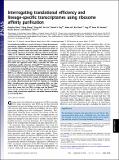Interrogating translational efficiency and lineage-specific transcriptomes using ribosome affinity purification
Author(s)
Day, Daniel Sindt; Zhou, Pingzhu; Zhang, Yijing; Ma, Qing; Gu, Fei; He, Aibin; Zhou, Bin; Li, Jing; Stevens, Sean M.; Romo, Daniel; Pu, William T.; ... Show more Show less
DownloadZhou-2013-Interrogating transl.pdf (1.239Mb)
PUBLISHER_POLICY
Publisher Policy
Article is made available in accordance with the publisher's policy and may be subject to US copyright law. Please refer to the publisher's site for terms of use.
Terms of use
Metadata
Show full item recordAbstract
Transcriptional profiling is a useful strategy to study development and disease. Approaches to isolate RNA from specific cell types, or from specific cellular compartments, would extend the power of this strategy. Previous work has shown that isolation of genetically tagged ribosomes (translating ribosome affinity purification; TRAP) is an effective means to isolate ribosome-bound RNA selectively from transgene-expressing cells. However, widespread application of this technology has been limited by available transgenic mouse lines. Here we characterize a TRAP allele (Rosa26[superscript fsTRAP]) that makes this approach more widely accessible. We show that endothelium-specific activation of Rosa26[superscript fsTRAP] identifies endothelial cell-enriched transcripts, and that cardiomyocyte-restricted TRAP is a useful means to identify genes that are differentially expressed in cardiomyocytes in a disease model. Furthermore, we show that TRAP is an effective means for studying translational regulation, and that several nuclear-encoded mitochondrial genes are under strong translational control. Our analysis of ribosome-bound transcripts also shows that a subset of long intergenic noncoding RNAs are weakly ribosome-bound, but that the majority of noncoding RNAs, including most long intergenic noncoding RNAs, are ribosome-bound to the same extent as coding transcripts. Together, these data show that the TRAP strategy and the Rosa26[superscript fsTRAP] allele will be useful tools to probe cell type-specific transcriptomes, study translational regulation, and probe ribosome binding of noncoding RNAs.
Date issued
2013-09Department
Whitaker College of Health Sciences and Technology; Harvard University--MIT Division of Health Sciences and TechnologyJournal
Proceedings of the National Academy of Sciences
Publisher
National Academy of Sciences (U.S.)
Citation
Zhou, P., Y. Zhang, Q. Ma, F. Gu, D. S. Day, A. He, B. Zhou, et al. “Interrogating Translational Efficiency and Lineage-Specific Transcriptomes Using Ribosome Affinity Purification.” Proceedings of the National Academy of Sciences 110, no. 38 (September 17, 2013): 15395–15400.
Version: Final published version
ISSN
0027-8424
1091-6490